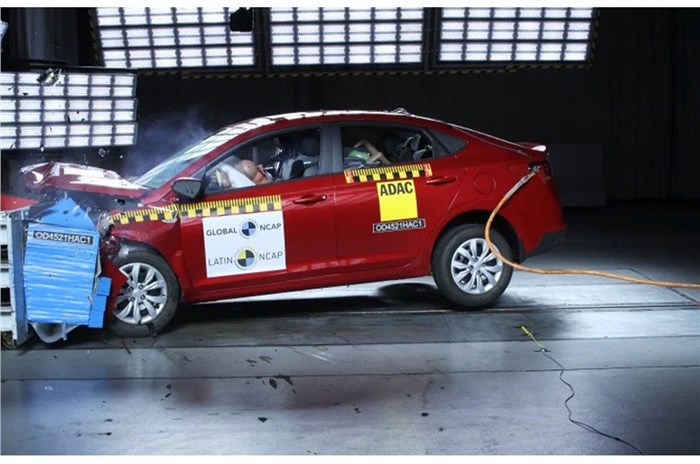Lack of standard features like passenger side airbag, ESC and non-recommendation of Child Restraint System led the Verna (Accent) to score 0 stars at the Latin NCAP crash tests.
Latin NCAP (Latin New Car Assessment Programme) has crash tested the 2021 Hyundai Verna that’s manufactured in India and Mexico, and it has come away with a discouraging score of 0 stars. The Hyundai Verna is sold as the Accent in Latin American markets, although Latin NCAP didn’t specify the exact origin of the crash tested model.
- Hyundai Verna scored 9.23 percent in adult occupant protection
- Child occupant protection was rated at 12.68 percent
- Crash tested model only came with driver side airbag and no ESC as standard
2021 Hyundai Verna Latin NCAP crash test results: details
Standard safety equipment on the Hyundai Verna’s test variant included only a driver’s side airbag, seat belt pretensioners for both driver and passenger, ISOFIX child seat mounts in the rear seats and a driver side seat belt warning.
In the frontal offset impact test, the Verna offered good protection to the driver’s and passenger’s head and neck regions, and while driver’s chest protection was adequate, it showed poor protection for passenger’s chest, leading to 0 points in frontal crash. The footwell area and bodyshell were, however, rated stable and it was capable of withstanding further loads.
Whiplash protection was also marginal, with just 1.57 points out of 3. As for side impact test, the Verna offered marginal to good protection, with 5.11 points out of 8. Overall score in frontal impact test was 3.69 or 9.23 percent.
In terms of child occupant protection, the Verna secured a score of 6.21 points or 12.68 percent. While it came with ISOFIX anchorages for the rear outward seats as standard, Hyundai did not recommend a Child Restraint System (CRS), leading to zero points in dynamic tests. Latin NCAP however did note that with CRS installed, the Verna offered good protection to a 3-year-old child dummy in rearward facing child seats, although some of the CRSs tested for installation failed.
Coming to pedestrian safety, the Verna offered marginal to good protection, with a 53.11 percent score. As for safety assist system, the Verna scored 6.98 percent only for the driver’s side seat belt reminder.
Latin NCAP also pointed out that even with dual front airbags, the safety rating would have been the same because of the non-recommendation of CRS and lack of side airbags and ESC as standard.
2021 Hyundai Verna gets more safety features in India
The Hyundai Verna that’s sold in India is slightly better equipped in terms of safety features, as compared to the version that was crash tested by Latin NCAP. These test results, thus, do not apply to the model sold here.
In India, the Verna gets dual front airbags as standard, ABS with EBD, reverse parking sensors, impact sensing auto door unlock, seatbelt reminder and pretensioners for both driver and passenger, and ISOFIX anchorages. Top-spec variants of the Verna further get features like side and curtain airbags, ESC, vehicle stability management (VSM), front parking sensors, TPMS, and rear disk brakes.
In contrast, the Latin-spec Verna gets passenger and side airbags, along with ESC, only as optional extras.
In other news, Hyundai is also working on the next-generation of the Verna that’s slated for a debut sometime next year. The all-new sedan was recently spied testing in South Korea. You can read more about it here.
What are your thoughts on the Verna’s 0 star safety rating from Latin NCAP? Let us know your comments below.
Also See:
SUV body style for mass-market EV ‘a no-brainer’: Hyundai India

























